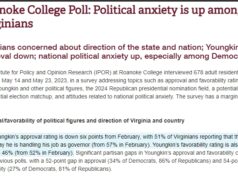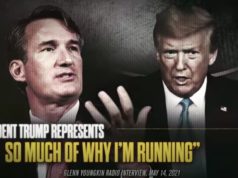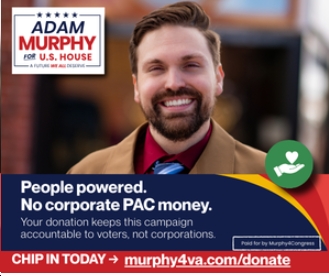Terry McAuliffe still has a couple more weeks to go until he starts running for president completes his term-limited four years as governor of Virginia, but I figured I’d take a stab at grading him now, with updates possible if anything significant happens by January 13, when Ralph Northam gets the keys to the Governor’s Mansion. Suggestions are welcome for anything I’ve missed here. Thanks.
Energy: According to the Solar Energy Industries Association (SEIA), Virginia’s national ranking when it comes to solar power fell to #20 in 2017, from #17 in 2016, with Virginia only getting 0.37% of its power from solar. On the other hand, Virginia’s installed solar has increased, according to Gov. McAuliffe’s office in March 2017 , by “over 174 megawatts…since 2014.” Still wayyyyy too little, but getting better. As for offshore wind power, Virginia is showing some movement on this front, but again wayyyy too little thanks in large part to Dominion Energy’s slow-walking, stalling, etc. On offshore drilling for fossil fuels, McAuliffe for most of his term has been an outlier – in a bad way – among east coast governors. In August 2017, McAuliffe kinda/sorta came out against offshore drilling, but mostly because of the Trump administration’s “failure to work out a revenue-sharing agreement with the states targeted in the drilling plan.” Worst of all, McAuliffe has been Dominion Energy’s biggest cheerleader, spewing out Dominion’s b.s. talking points at every opportunity, for the proposed Atlantic Coast Pipeline. All this is even more disappointing and infuriating when compared to McAuliffe’s 2009 run for the Democratic gubernatorial nomination, when he was all about clean/green sources of energy, such as offshore wind. Since then, even as the urgency of getting off fossil fuels has increased and as the cost of clean energy has plummeted, McAuliffe has actually gotten worse on energy issues. I’m giving him a “D” (for disappointing and dumb) on this one.
Conserving open space: As governor, Tim Kaine worked to preserve “more than 400,000 acres of open space in the Commonwealth,” and Terry McAuliffe made the same pledge when he was running for governor in 2013. As of June 2015, however, McAuliffe wasn’t even close to being on pace, with “Virginia [having] preserved about 36,500 acres under McAuliffe, according to Molly Ward, the secretary of natural resources.” I checked the governor’s website and couldn’t find any indication that this pace picked up since June 2015, so it looks like McAuliffe won’t even come close to reaching the 400,000 acres he promised — or that Tim Kaine managed to preserve when he was governor. I’ll give McAuliffe another “D” (for what, deforestation?) on this one.
Chesapeake Bay: McAuliffe claims that he and “his administration have worked tirelessly to protect the Chesapeake Bay and find federal funding for land conservation,” also that “in 2014, McAuliffe signed the Chesapeake Watershed Agreement, the first formal agreement in which every Bay State specifically recognizes the threat of Climate Change.” According to the Chesapeake Bay Foundation, the Bay received an overall “health index” score of 32/D+ in 2014, unchanged from 2012, with a slight improvement to 34/C- in 2016. Of course, most of that has to do with programs underway for years, so I’m not sure how much credit to give Gov. McAuliffe, even if he received a “Champion of the Chesapeake” award from the Chesapeake Bay Conservancy. I’ll give McAuliffe a “C+” (for the Chesapeake Bay slowly improving) on this one.
Environment: Combining McAuliffe’s scores so far on energy, open space and the Chesapeake Bay gives him around a D+/C- on environmental issues as governor. I’m also very frustrated that McAuliffe refuses to even consider divestment from fossil fuels. However, I am encouraged by the plan for Virginia to “join nine other states in the Regional Greenhouse Gas Initiative (RGGI), the nation’s longest-running mandatory carbon market,” although my understanding is that this is not a done deal yet thanks to Dominion tools like the deplorable Sen. Frank Wagner (R-Dominion Energy). Adam Siegel has a thorough review of Terry McAuliffe’s enviro record and concludes that he has NOT been a “climate champion. Among other problems Adam Siegel identifies was McAuliffe’s inexcusable, disgraceful “Pushback to the Clean Power Plan, often using false claims about its implications for Virginia.” All things considered, I’ll give McAuliffe a “D+” grade when it comes to energy and the environment, identical to the Chesapeake Climate Action Networks’ “D+” grade. Such a disappointment, particularly in comparison to the governor of the state where McAuliffe was born – New York’s Andrew Cuomo, who has shown real leadership when it comes to pipelines, reforming the state’s energy vision, fossil fuel divestment, etc. Let’s put it this way; if it’s McAuliffe vs. Cuomo for the 2020 Democratic presidential nomination, I know who my preference will be, and it ain’t TMac!
Voting Rights: McAuliffe gets an A on this one, if for no other reason than his blanket restoration of voting rights to ex felons. McAuliffe also vetoed Republican voter suppression bills, such as this garbage. Nice job!
Education: In his 2013 campaign for governor, McAuliffe called for “increasing state spending on public education, which currently lags below 2009 levels, and for boosting teacher salaries,” also for “overhauling the state Standards of Learning tests.” As governor, McAuliffe took some actions, such as directing “the Board of Education to issue emergency regulations to provide Virginia’s colleges and universities the option to offer an undergraduate major in teaching”; adding a bit of funding “to automate the teacher licensure process,” to “support the recruitment and retention of principals in Virginia’s most challenged school divisions,” and to “help cover the cost of tests and test-preparation programs for provisionally licensed minority students.” McAuliffe also vetoed six pieces of legislation earlier this year that “would undermine support for Virginia’s public education system,” as well as the so-called “Tebow bill.” And on July 1, 2016, McAuliffe announced that the new biennial budget would include “$1 billion in new resources for education at all levels across the Commonwealth to support K12 and higher education, including $55 million in new financial aid,” plus “$70 million in new resources for universities to secure top research talent and expand the talent pipeline to create new companies and jobs” and “$2 million for schools to adopt in-school breakfast programs to improve childhood nutrition and increase academic performance.” Finally, McAuliffe did take some steps towards reforming the SOLs, but serious criticisms remain, ones which I agree with. Overall, education is a difficult area to assess, and there’s no doubt that McAuliffe’s administration made some progress, but of course lots of work remains in a variety of areas, such as increasing teacher pay. Perhaps this is appropriate for the education category, but I’m simply going to give this one an “incomplete” grade, with hopes that Gov.-elect Ralph Northam, Secretary of Education Atif Qarni and a much more Democratic House of Delegates means better days ahead for education in Virginia.
Ethics Reform; Reining in Corporate Power: During Terry McAuliffe’s four years in office, we saw baby steps in the direction of ethics reform following the Bob McDonnell scandal, such as McAuliffe’s self-imposed gift limit and this weak sauce (“toothless” ethics legislation that was “so anemic you almost wonder why they bothered”). However, this wasn’t even close to what is needed to combat the slimy, incestuous, “legally corrupt” system of pervasive corporate influence euphemistically known (in an Orwellian sense) as the “Virginia Way.” For instance, a bill to prohibit state-“regulated” (in air quotes) monopoly utility Dominion Energy – the bare minimum, one would think, in any serious ethics reform legislation in Virginia – died in the legislature. I’d note that the system we have now, which is based on the concept of “public disclosure” (e.g., if certain, limited information is put up on the relatively obscure VPAP in a manner such that 99.9% of Virginians will never even know about it, that’s supposed to solve the problem – lol!), has been an almost complete failure (note, by the way, that VPAP itself is sponsored by many of these same corporations, such as Dominion; gotta love it!). As for reining in corporate power more broadly, I saw basically zero sign of McAuliffe – or the General Assembly, including both Republicans and ethics-challenged Democrats like Dick Saslaw – having any inclination to do that, nor did I even see a recognition that this is a huge problem in Virginia. Keep in mind that McAuliffe signed into law a bill freezing Dominion’s rates and suspending reviews by the State Corporation Commission. All in all, it’s very hard to give McAuliffe better than a “D” grade on this one. Very unfortunate.
Metro: It’s very hard to give McAuliffe better than a “C” grade on this one, as Metro is in big trouble and it’s largely thanks to lack of leadership by Virginia and Maryland. In fairness, the Virginia legislature has been controlled by Republicans during McAuliffe’s term in office, but McAuliffe hasn’t exactly been a profile in political courage on this issue either. For instance, see this October 2016 article, which notes that McAuliffe “declined to take a stand on a [dedicated tax to fund Metro], on the grounds that it was premature.” I also agree with DC Mayor Muriel Bowser that Metro needs more money, not more studies, such as this one commissioned by McAuliffe. Finally, as he heads out the door, McAuliffe is proposing higher taxes in Northern Virginia – better late than never, I guess, but it would have been nice to have had this money a few years ago.
Transportation: We already discussed Metro, where McAuliffe gets a “C” grade (being generous here). Another big transportation story of this past year was I-66 tolls kicking in, part of a project to help fix one of the most congested roads in America, with Gov. McAuliffe pushing back hard against criticism, some of which came from within his own party. Personally, my view is that more pavement simply leads to “induced demand,” while encouraging more sprawl, and that it’s basically the opposite of what we need to be doing, which is smart growth/transit-oriented development. Other than that, we had lots and lots of express lanes: I-95 Express lanes opening in late 2014, “early and on budget”; the I-66 outside-the-Beltway Express lanes project; etc. Regarding rail, McAuliffe announced in July 2016 “that Virginia’s proposed Atlantic Gateway Project has been selected for a federal FASTLANE grant of $165 million” to “Transform Road and Rail Infrastructure Along the I-95 Corridor.” Overall, though, I didn’t see a great emphasis on rail, let alone high-speed rail, which I’d say was unfortunate. In sum, if you like Express lanes, more pavement and dynamic tolling, you probably loved McAuliffe on the transportation front. I’m fine with dynamic tolling, have mixed feelings about Express lanes, and don’t like more pavement, so I’d give McAuliffe an overall mediocre grade, maybe a “C+”, when it comes to transportation.
Guns: McAuliffe certainly has done some good stuff when it comes to guns, such as banning firearms in most state offices. McAuliffe also has vetoed a bunch of bad bills when it comes to guns. On the other hand, McAuliffe also reversed Attorney General Mark Herring’s excellent move on “concealed-carry reciprocity,” cutting a deal with the NRA that gun violence prevention advocate Lori Haas strongly criticized. In that same deal, McAuliffe also agreed to a compromise calling for voluntary background checks at gun shows, which Haas said was “hardly worth mentioning.” Haas concluded that the “glee the radical NRA and Virginia Citizens Defense League have expressed about this deal, as opposed to the anger and disappointment of gun violence prevention advocates, is a dead giveaway that McAuliffe did not get the best public safety package he could have.” Taking all this into account, I’d give McAuliffe a “C” when it comes to guns.
Medicaid: McAuliffe gets a ton of credit here for trying to expand Medicaid, in the face of intransigent, irrational opposition from Republicans in the Virginia General Assembly. McAuliffe hasn’t given up yet, as he’s included Medicaid expansion in his final budget. Unfortunately, despite McAuliffe’s efforts, at least to date Medicaid has not been expanded here in Virginia. So…”A” for effort, but sadly “no cigar” so “D” for actual results so far (with the hope that perhaps McAuliffe’s final budget, plus a much more Democratic Hosue of Delegates, will finally result in something good in 2018).
Jobs/Economy: I’m not sure the governor of Virginia has a great deal of impact on Virginia’s economic picture, frankly, given our enormous reliance on federal – civilian and military – spending. No doubt, McAuliffe wants to be known as the jobs governor, and overall Virginia’s economy remains in solid shape – unemployment at 4.1% (below the 5.4% when McAuliffe took office), claims of “1,000 new economic deals worth more than $16 billion in new economic investment – more than any administration in our Commonwealth’s history,” etc. Overall, I can’t really criticize McAuliffe when it comes to Virginia’s economic performance, but it’s also hard to point to much he did – or any governor can do, really, other than screw things up (which McAuliffe did NOT do) – during his term as governor. And the fact is, while McAuliffe was governor, the national economy continued to improve, unlike during Tim Kaine’s governorship, when the national economy collapse in 2008-2009. Still, what the heck, I’m in the holiday spirit so I’ll be generous and give TMac a “B” on this one, mostly because he tried so damn hard.
Reproductive Choice: McAuliffe pledged a gazillion times to be a “brick wall” against Republican attempts to defund Planned Parenthood and to infringe on women’s reproductive health and freedom – and for the most part, I’d say he has fulfilled that promise. A highlight on this front came in October 2016, when Virginia rolled back “hospital-style building codes for all abortion clinics.” McAuliffe also vetoed a bunch of bad GOP legislation on this front, including this attack on Planned Parenthood. Overall, I think McAuliffe deserves an “A” on this front, as he kept his promise to be a “brick wall.”
LGBT Equality: See here for the Human Rights Campaign praising McAuliffe’s “veto of Senate Bill (SB 1324) and House Bill (HB) 2025 — discriminatory legislation seeking to give taxpayer-funded agencies and service providers a license to discriminate against LGBTQ people under the guise of religion.” McAuliffe also banned state contracts with firms which discriminate against LGBT people. McAuliffe has also spoken out repeatedly and consistently for full LGBT equality and protection from discrimination. All in all, I’d say McAuliffe deserves an “A” on this issue.
Political: Unfortunately for McAuliffe, he lost control of the State Senate when Phil Puckett resigned on June 9, 2014, and never regained control. The 2015 elections were McAuliffe’s chance to win back the State Senate, but the tag team of McAuliffe and Saslaw completely blew it, with a strategy/resource allocation that made no sense whatsoever and with their thumbs heavily on the scales for their conservadem candidate Dan Gecker. So stupid – and yes, I said so at the time, so it’s not “Monday Morning QB’ing.” Anyway, with that, McAuliffe blew his chance to win back the State Senate and possibly – just possibly – get Medicaid expanded. On the other hand, McAuliffe did get his guy, Ralph Northam, the Democratic nomination for governor this year, and Northam went on to win the election easily over Ed Gillespie. All in all, I’d give McAuliffe a “C” for politics, with the Northam and House of Delegates wins bringing up the score significantly.
OVERALL GRADE: It’s hard to know how to weight each one of these issues, so I wouldn’t just add up the scores and average them out. In the end, McAuliffe’s final grade comes down to what you are most focused on, I guess. My view is that McAuliffe was generally very strong (A?) on “social issues,” not good (D+) on energy or environmental issues or on Metro funding, D on ethics and decent (B?) when it comes to economics. Average those together, and you basically end up with a C+/B- or so. That seems about right to me. What do you think?












![Saturday News: “Ukraine is the biggest and most consequential of all the American betrayals”; “Get Ready for Zombie Tariffs”; Murdoch’s WSJ – “Trump Demeans Himself as He Attacks the Supreme Court”; “Virginia House Delays Action on Bill Banning [Lethal Pesticide] Paraquat”](https://bluevirginia.us/wp-content/uploads/2026/02/montage0221-100x75.jpg)